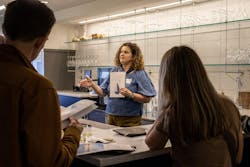Coffee quality and climate change: How OSC operators can help preserve the perfect cup
What makes an excellent cup of coffee so delicious? The happy interplay of bean and water at precise portions and temperatures. Getting the most from those key ingredients may be challenged by climate conditions.
In Automatic Merchandiser's 2023 State of the Office Coffee Service Industry Report, one in four office coffee service (OCS) operators reported seeking environmentally friendly coffee-related products. Roughly half of Gen Z and millennial employees are putting pressure on their employers to act on climate change, and employers are looking to implement sustainable products and solutions to attract and retain top talent.
Sustainability in coffee service is not a passing trend — it is here to stay. With that in mind, here are some insights and actionable tips on how OCS operators can reduce their environmental footprint.
Climate change and coffee
Coffee is one of the most consumed beverages worldwide. According to the USDA’s recent coffee report, global coffee consumption for 2024-2025 is expected to increase to 170.6 million bags. As global coffee consumption increases, however, its supply is dwindling and consolidating to a few dominant countries. According to a World Coffee Research annual report, climate change is compounding these challenges.
Longer droughts, heavier rainfall, and increased temperatures can lead to reduced coffee crop yields. Predictions estimate that approximately 50% of the global land currently dedicated to the cultivation of premium coffee may become unproductive by 2050. Water is vital to the cultivation of coffee plants and is a key ingredient in the brewing process, making its quality paramount to the final taste of coffee. As weather patterns shift, this can lead to significant changes in the quality of water around the world, which, in turn, influences the flavor profile of coffee. For instance, over 90% of Nicaragua’s coffee-growing regions are projected to face increasingly unfavorable conditions in the next 30 years.
For vending operators and office coffee service providers, the implications of climate change on water and coffee quality are significant. Climate change may reduce coffee availability in certain regions, potentially leading to a rise in coffee prices. Coffee service operators may also face increased difficulty in sourcing high quality coffee beans that consistently meet flavor standards. This could require vendors to diversify suppliers or explore alternative coffee varieties that are less susceptible to climate impacts.
With more algae blooms during the summer months, chloramine is increasingly used to treat drinking water. As a result, equipment adjustments may be required as variations in water quality could affect brewing performance. Lastly, by offering advanced filtration systems, OCS operators can ensure that customers’ water is environmentally friendly, of premium quality and great tasting.
Rethinking and reducing emissions
At Vivreau, one of our core values is thinking in generations. This means that if we want to leave a better planet for future generations, we must manage the impact we are making now. Carbon dioxide emissions and plastic waste already create challenges for water quality. Added contaminants, evolving mineral content and treatment programs are changing the taste, mouthfeel and odor of tap water. Beyond affecting how water tastes, it also impacts the flavor and quality of anything that uses water as an ingredient — like rice, baked goods, and most notably, coffee.
OCS operators are already taking strides in environmental offerings, with 29.5% reporting they offered more water filtration devices to reduce bottled water in 2023 than the previous year. More than 35% said they offered recycled products such as cups, filters and utensils. Operators also can educate their customers on how to provide coffee in a more sustainable way, which can help drive engagement, loyalty and create a positive brand image.
Another way for OCS operators to collectively help businesses reduce their carbon footprint is to offer reusable options where possible such as stainless-steel water bottles or reusable coffee cups. Most individuals have heard of reduce, reuse and recycle, but the fourth R — "refuse" — is particularly relevant. In the United States, only about 5 to 6% of plastics are recycled each year. Operators can refuse to offer items such as disposable straws or plastic water bottles that do not meet their own organization’s environmental standards.
Preserving that perfect cup
Although there is still a gap in long-term studies capturing the impact of environmental exposure on coffee quality, several aspects are certain: rising temperatures are projected to reduce coffee yields, and coffee-producing regions are already experiencing climate conditions outside optimal ranges. Action is needed, and each step goes a long way.
There is a growing demand among employees for their employers to become more sustainable, and OCS operators are taking significant strides by offering eco-friendly products and solutions such as water filtration devices, recycled products, and coffee with sustainability features such as organic or fair trade.
By reducing plastic waste, offering reusable options, and using the fourth “R,” OCS operators can make a positive impact on not only the environment but also their customer base, their employees and their customers’ employees.
About the Author

Tom Spillane
Tom Spillane is vice president of technical excellence at Vivreau Advanced Water Systems, Vancouver, B.C., a company that designs and manufactures water systems, including water dispensers and bottling systems.


